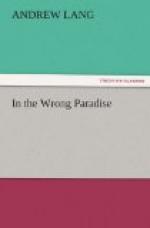“But,” I interrupted, “your father knew all the scroll had to tell him, else he could not have copied it on Gumbo. So why was he in such a rage?”
“You,” said Moore, with some indignation, “are not a collector, and you can’t understand a collector’s feelings. My father knew the contents of the scroll, but what of that? The scroll was the first edition, the real original, and Gumbo had destroyed it. Job would have lost his temper if Job had been a collector. Let me go on. My brother and I both conjectured that the scroll had some connection with the famous riches of the Sun and the secret of the Pyramid of Teohuacan. Probably, we thought, it had contained a chart (now transferred to Gumbo’s frame) of the hiding-place of the treasure. However, in the confusion caused by my father’s illness, death, and burial, Gumbo escaped, and, being an unusually stupid nigger, he escaped due south-west. Here he seems to have fallen into the hands of some slave-holding Indians, who used him even worse than any white owners would have done, and left him the mere fragment you saw. He filtered back here through the exchange of commerce, ‘the higgling of the market,’ and as soon as I recognized him at the sale I made up my mind to purchase him. So did my brother; but, thanks to Peter and his hornets, I became Gumbo’s owner. On examining him, after he was well washed on the night of the attack, I found this chart, as you may call it, branded on Gumbo’s back.” Here Moore made a rapid tracing on a sheet of paper. “I concluded that the letters S M (introduced by my father, of course, as the Indian scroll must




